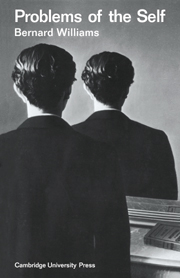Book contents
- Frontmatter
- Contents
- Dedication
- Preface
- 1 Personal identity and individuation
- 2 Bodily continuity and personal identity
- 3 Imagination and the self
- 4 The self and the future
- 5 Are persons bodies?
- 6 The Makropulos case: reflections on the tedium of immortality
- 7 Strawson on individuals
- 8 Knowledge and meaning in the philosophy of mind
- 9 Deciding to believe
- 10 Imperative inference
- 11 Ethical consistency
- 12 Consistency and realism
- 13 Morality and the emotions
- 14 The idea of equality
- 15 Egoism and altruism
- Bibliography
- Index of names
13 - Morality and the emotions
Published online by Cambridge University Press: 07 December 2009
- Frontmatter
- Contents
- Dedication
- Preface
- 1 Personal identity and individuation
- 2 Bodily continuity and personal identity
- 3 Imagination and the self
- 4 The self and the future
- 5 Are persons bodies?
- 6 The Makropulos case: reflections on the tedium of immortality
- 7 Strawson on individuals
- 8 Knowledge and meaning in the philosophy of mind
- 9 Deciding to believe
- 10 Imperative inference
- 11 Ethical consistency
- 12 Consistency and realism
- 13 Morality and the emotions
- 14 The idea of equality
- 15 Egoism and altruism
- Bibliography
- Index of names
Summary
Recent moral philosophy in Britain has not had much to say about the emotions. Its descriptions of the moral agent, its analyses of moral choice and moral judgement, have made free use of such notions as attitude, principle and policy, but have found no essential place for the agent's emotions, except perhaps for recognising them in one of their traditional rôles as possible motives to backsliding, and thus potentially destructive of moral rationality and consistency. Much the same is true when one turns to what has been said about the objects of moral judgement: here there is much discussion of what it is to judge favourably or unfavourably actions, decisions, principles, states of affairs, intentions; indeed, men and men's characters. There is less, however, about what a man ought or ought not to feel in certain circumstances, or, more broadly, about the ways in which various emotions may be considered as destructive, mean or hateful, while others appear as creative, generous, admirable, or – merely – such as one would hope for from a decent human being. Considerations like these certainly play a large part in moral thought, except perhaps in that of the most restricted and legalistic kind; but it is my impression that the part they play has not adequately been mirrored in the recent concerns of moral philosophers.
There are a number of reasons for this neglect.
- Type
- Chapter
- Information
- Problems of the SelfPhilosophical Papers 1956–1972, pp. 207 - 229Publisher: Cambridge University PressPrint publication year: 1973
- 49
- Cited by



